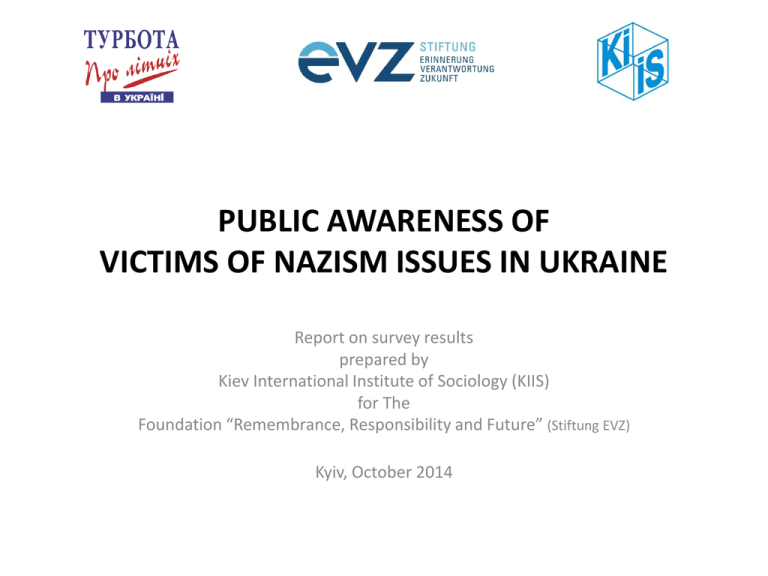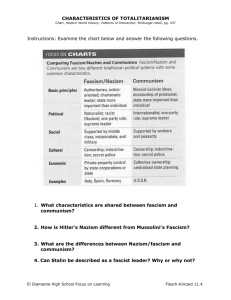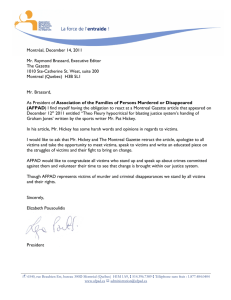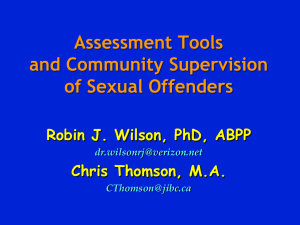1 - Stiftung "Erinnerung, Verantwortung und Zukunft"
advertisement

PUBLIC AWARENESS OF VICTIMS OF NAZISM ISSUES IN UKRAINE Report on survey results prepared by Kiev International Institute of Sociology (KIIS) for The Foundation “Remembrance, Responsibility and Future” (Stiftung EVZ) Kyiv, October 2014 INFORMATION ON SURVEY METHODOLOGY 2 Methodology • The current survey on public awareness of victims of Nazism issues in Ukraine was carried out by the Kyiv International Institute of Sociology on request of the Ukrainian not-for-profit non-governmental voluntary organization “Age Concern Ukraine” (“Турбота про літніх в Україні”), which, within the framework of realization of the programme “Meeting Point: Dialogue” sponsored by Stiftung “Erinnerung, Verantwortung, Zukuft” , supports projects, aimed to promote social and psychological improvement for the Nazi victims in Ukraine. • The purpose of the study is to measure the opinions, attitudes and behaviour of Ukrainians towards the victims of Nazism and elderly people in general. The survey including following themes: importance of victims’ experience for modern Ukrainian society, social status of former victims of Nazism and other elderly people in Ukraine, generation link, readiness to help elderly people and intention to be involved. • To meet the project objectives, this study included the following stages: – Public opinion survey of adult population of Ukraine. Overall 2035 respondents aged 18 and above (286 of them aged 70 and above) were interviewed face-to-face at their homes in 110 settlements in all regions of Ukraine (except Luhansk and Crimea). The face-to-face survey was carried out between the 12th and 21 of September 2014. Statistical sample error for total adult population with probability of 0.95 and design-effect of 1.5 does not exceed 3.3%. – Computer assisted telephone interview (CATI) of people aged 70 and above. In order to obtain more precise information on size of target group, and to identify their needs and living conditions, a special-purpose telephone survey of people aged 70 and above was conducted. The telephone survey was carried out between 24 th and 26th of September 2014. Overall 616 respondents aged 70 and above were interviewed by telephone. So the total number of respondents aged 70 and above is 902. Statistical sample error for people aged 70+ with probability of 0.95 and design-effect of 1.5 does not exceed 4.8%. 3 Public awareness of victims of National Socialism and the estimates of the number of victims who currently live in Ukraine SECTION 1 4 PERSONAL ACQUAINTANCE WITH VICTIMS OF NAZISM • About 11% of people in Ukraine personally know someone who can be called a victim of Nazism. In this survey we defined victims of Nazism as all people who suffered from National Socialism injustice at the time of World War II (prisoners at concentration camps and ghettos, forced labourers, prisoners of war and others). •Victims of Nazism can be found among relatives and friends of people in any age group. The rate of people who reported that they know somebody who can be called a victim of Nazism varies from 8% among people aged 18-29 to 10%12% among people of middle age groups and 14% among people aged over 70. Among your acquaintances (either relatives or friends), who live in Ukraine, do you have somebody who can be defined as a "victim of Nazism"? Difficult to say 4% Yes 11% •In Western, Southern and Central oblasts of Ukraine there are slightly more people who knows someone who suffered from Nazism during WW II. Among residents of those regions 11%-13% reported they know some people who are victims of Nazism, while only 6% do this in Eastern oblasts . •Victims of Nazism often know each other. According to survey results, about a half (53%) of victims of Nazism knows someone else with a similar life experience. No 85% 5 AMOUNT OF VICTIMS OF NAZISM AMONG PEOPLE’S ACQUAINTANCES •Three quarters (76%) of people, who knows someone who suffered from National Socialism injustice during WW II, mentioned that they know from one to three such victims. About 11% answered they personally know from 4 to 20 victims of Nazism. •Average number of victims , known by a person, do not depend on person’s age and region, but is higher among people who are victims of Nazism themselves: people who suffered from National Socialism in average tend to know three other victims, while others in average knows less than 2 victims. •If we extrapolate these results on general population, we can estimate how strongly victims of Nazism are involved in the network of social relationships - it is clear that one victim could be known by many other people, so the more contacts we observe, the larger involvement is. •According to the data provided by State Statistics Service of Ukraine, there are about 37 million of adults living in Ukraine. According to our estimates, 3.8 million (11%) know somebody who is a victim of Nazism, and an average number of such acquaintances is 2.29. Our data suggests that there are 486.7 thousand of victims of Nazism who at this time live in Ukraine. So we can state, that on average one victim has about 18 acquaintances among people living in Ukraine. How many such people do you know? It means that you know them by sight and by name, and that there has been some contact (either in person, by telephone or mail) in the past 2 years. 1 2 3 4 5 6 7 8 10 15 20 Difficult to say 43% 19% 14% 2% 3% 2% 0% 1% 1% 1% 0% 13% 6 AMOUNT OF VICTIMS OF NAZISM LIVING IN UKRAINE (AS SELF-DEFINED) •According to joined data of face-toface and telephone surveys, about 9.5% of people now aged over 70 was victims of Nazism at the time of World War II. Among elderly people living in Ukraine 2% were forced laborers, 0.9% were prisoners of war, 0.8% are Jews who survived the Holocaust, 0.8% were prisoners at concentration camps or ghettos, 0.2% are Roma who survived the Holocaust, 5.7% defined themselves as other kind of victims of Nazism. •According to State Statistics Service of Ukraine, at the beginning of this year the total number of people aged 70 years and over was 5 105 089. If we assume that 9.5% of them were victims of Nazism, we can state, that there are about 486.7 thousand people living in Ukraine who suffered from National Socialism injustice at the time of World War II. Please look at this card and tell me whether you can be ascribed to any of these groups? (PEOPLE AGED 70 YEARS AND OVER) Forced labourers (Ostarbeiters) Roma (Gypsy) who survived the Holocaust Jews who survived the Holocaust Prisoners at concentration camps or ghetto Prisoners of war Other category of victims 2.0% 0.2% 0.8% 0.8% 0.9% 5.7% Not a victim Difficult to say / Don't know 85.3% 5.2% *Multiple answers allowed so sum is larger than 100%. 7 AGE AND GENDER DISTRIBUTION OF VICTIMS •Females constitute a major part of all victims of Nazism living in Ukraine, as well as a major part of all elderly people in Ukraine. According to survey results, 75% of people reported themselves as victims of Nazism are female, 25% - male. •Almost a half (48%) of people who suffered form Nazism are now aged between 75 and 79 (born in 19351939). More than a quarter (27%) are people aged under 75, and 26% are aged over 79. Age and gender distribution of victims of Nazism living in Ukraine 90 and over 1% 3% Female 85-89 years 80-84 years 75-79 years 70-74 years Male 8% 2% 11% 15% 33% 7% 20% 8 PLACE OF CURRENT RESIDENCE Distribution of victims of Nazism by region of current residence •According to survey results, victims of Nazism live all over Ukraine: 37% of them live in Central oblasts, 22% - in Western oblasts, 21% - in Southern oblasts and 20% - in Eastern part of Ukraine. •About 40% of victims live in rural area, and 60% are urban residents. Eastern 20% Western 22% Southern 21% Central 37% *Western region: Volynska, Zakarpatska, Ivano-Frankivska, Lvivska, Rivnenska, Ternopilska, Khmelnytska, Chernivetska oblast; Central region: Kyiv, Kyivska, Vinnytska, Zhytomyrska, Kirovogradska, Poltavska, Sumska, Cherkaska, Chernigivska oblast; Southern region: Dnipropetrovska, Zaporizka, Mykolaivska, Odeska, Khersonska oblast; Eastern region: Kharkivska, Donetska oblast. 9 Importance of victims’ experience for modern Ukrainian society SECTION 2 10 IS THE EXPERIENCE OF VICTIMS OF NAZISM IMPORTANT FOR MODERN UKRAINIAN SOCIETY? •An absolute majority (78%) of Ukrainians think that it is important for modern Ukrainian society to remember and properly understand the experience of victims of Nazism. •Victims of Nazism and people who knows someone who suffered from National Socialism are generally express higher levels of concern about memory retention and proper understanding of the lessons of the past. •In addition, people from Western region and elderly people tend to attach more importance to this issue than people from Eastern oblasts and young people. Do you believe it is important or not important for modern Ukrainian society to remember and properly understand the experience of victims of Nazism? Don't know Not at all 15% Very important important 2% 35% Not very important 6% Somewha t important 42% 11 IS THE VICTIMS OF NAZISM RECEIVING ENOUGH PUBLIC ATTENTION? •A majority of 56% of the respondents feel that nowadays in Ukraine the victims of Nazism receiving too little public attention. •The idea that victims of Nazism nowadays do not receive enough public attention prevails in all age groups and in all regions. •People from Western oblasts and elderly people are slightly higher concerned with this issue. •People who suffered from National Socialism and their acquaintances demonstrate the highest level of dissatisfaction with the current level of public attention towards needs and problems of victims of Nazism. In your opinion, is nowadays in Ukraine the victims of Nazism receiving enough or not enough public attention? Don't know 26% Not enough 24% Quite enough 4% Rather enough than not enough 14% Rather not enough than enough 32% 12 IS THE EXPERIENCE OF FORMER VICTIMS OF NAZISM WAS TAKEN INTO ACCOUNT AND PROPERLY PERCEIVED IN UKRAINE? •A major part of Ukrainian citizens hold an opinion that the experience of former victims of Nazism was not properly perceived and recognized in our state: 50% of the respondents disagreed with the statement that “the experience of former victims of Nazism was taken into account and properly perceived in our state”, 26% hold an opposite opinion, and the quarter of respondents had no certain opinion on that question. Please tell me whether you agree or disagree with the following statement: "The experience of former victims of Nazism was taken into account and properly perceived in our state". Strongly Agree Disagree Don't know 6% Somewhat 21% 20% 30% 25% 13 NEED FOR INFORMATION ABOUT WORLD WAR II FROM EYEWITNESSES •Absolute majority (58%) of Ukrainian people would like to get more information about World War II and National Socialist crimes from the eyewitnesses of these events. •The highest need for such information was observed in Western region: almost 73% of respondents from Western oblasts noted that they would like to get more information about WW II from the people who knows about war from their own experience. • People in other regions also feel a strong need for information about World War II: in Central region 56% would like to get more information, in Southern region – 55%, in Eastern region – 49%. •Information about World War II attract interest of people at any age, except people aged over 70 where the level of information need go down to 50%. The possible reason why elderly people are less interested in receiving more information about WW II is that they themselves were witnesses of that events , and that’s why they do not feel a strong need for such information. Please tell me whether you agree or disagree with the following statement: "I'd like to get more information about World War II and National Socialist crimes from the eyewitnesses of these events". Strongly Agree 16% Somewhat 43% Disagree 3%17% Don't know 22% 14 NEED FOR STRENGTHENING SOCIAL WORK FOR THE ELDERLY •Absolute majority (84%) of survey respondents agreed that there should be more social work programs for the elderly people in Ukraine to meet their needs and increase their social integration in society. Only 6% of respondents told that for now there is no such need. •People aged over 40 are in general more often agreed that there is a strong need for strengthening social work for the elderly, but young people also for the most part agreed that elderly people need more help and support. Please tell me whether you agree or disagree with the following statement: "There should be more social work programs for the elderly people in Ukraine". Strongly Agree 38% Somewhat 46% Disagree 1% 5% Don't know 11% 15 ATTITUDE TOWARDS GERMANY •People in Ukraine tend to respect FRG for the help for victims of Nazism provided by this country: 65% of survey respondents agreed, that regardless of the past, they have respect for FRG because of their help to victims of Nazism in Ukraine. •Victims of Nazism and their acquaintances greatly appreciate the FRG efforts towards helping people which suffered from National Socialism persecutions. According to survey results, 71% of victims and 78% of their acquaintances respect FRG for the help. That means that receiving help, or awareness of FRG efforts to help victims, make people forgive and come to terms with the past. Please tell me whether you agree or disagree with the following statement: "Regardless of the past, I have respect for Federal Republic of Germany because of their help to victims of Nazism in Ukraine". Strongly Agree 20% Somewhat 45% Disagree 2% 9% Don't know 24% 16 ATTITUDE TOWARDS COUNTRIES THAT WERE UKRAINE’S ENEMIES IN WORLD WAR II •Absolute majority (74%) of Ukrainian people do not feel hatred and passion for revenge towards people from the counties that were Ukraine’s enemies in World War II. •About 9% of respondents reported that they have a hostile attitude towards people from Germany and it’s allies during the Second World War. •The part of people who still tend to retain negative attitude towards people from the countries that were our enemies in WW II is slightly higher among victims of Nazism (21% feel negative) and people from Southern oblasts (17%). There were no significant age differences in this question. Please tell me whether you agree or disagree with the following statement: “I feel hatred and passion for revenge towards people from the countries that were our enemies in World War II “ Strongly Somewhat Agree 3% 6% Disagree Don't know 40% 34% 17% 17 Help for victims of Nazism and the needs of the elderly SECTION 3 18 WHO SHOULD BE RESPONSIBLE FOR HELPING THE VICTIMS? •Major part (53%) of people in Ukraine lay the responsibility for helping the victims of Nazism on Ukrainian central authorities. •About 15% think that it is FRG who should primarily provide help for the victims of Nazism in Ukraine. Besides, about 12% lay the prime responsibility for helping victims on local authorities, 7% - on NGO’s, 2% - on their relatives and friends. •Victims of Nazism and their acquaintances tend to lay more responsibility for providing help on local authorities. The other differences in answers are not significant. Who do you think should primarily provide help for the victims of Nazism in Ukraine? 53% Central authorities Local authorities Family, relatives Federal Republic of Germany Non-governmental organizations Don't know 12% 2% 15% 7% 12% 19 LIVING STANDARDS OF OLDER PEOPLE •Living standards of older people are significantly worse as compared with the whole population. •Absolute majority of elderly people live below the poverty level: 20% of all people aged over 70 years do not have enough money even for food, and 62% barely have enough money to buy food, but rarely buy clothes. •Only 14% of elderly people reported that they have some savings and can buy something beyond basic needs (like food and clothes). Please look at this card and tell me, which statement best describes the current financial situation of you and your family living there with you? We do not have enough money even for food We barely have enough money to buy food, we rarely buy clothes We have enough to eat and to buy clothes, and we have some savings, but we do not have enough money to buy expensive goods (TV-set, fridge) We have enough money to buy expensive goods (TV-set, fridge), but can't afford a lot We can afford a lot Don't know 70 and over 20% 60-69 years 8% 50-59 years 8% 40-49 6% years 30-39 years 7% 18-29 3% years 62% 13% 1%3% 54% 35% 39% 39% 31% 33% 43% 44% 53% 47% 1%2% 7% 2% 9% 3% 8% 1% 13% 4% 20 NEED FOR HELP AMONG ELDERLY PEOPLE •Elderly people, and especially victims of Nazism, often need help and support. According to survey results, more than a half (52%) of elderly people and 65% of victims of Nazism noted, that they need some help. •The most common need of elderly individuals is a monetary support: about 32% of all people aged over 70 and 42% victims of Nazism indicated that they need financial aid. •Elderly people often need help buying medicines (8%), help with housework (5%), and so on. •Victims of Nazism more often than other elderly people feel a need for communication: 10% of surveyed victims and 5% of all elderly people noted, that they need someone to talk with. Besides, victims of Nazism more often need help repairing their homes (10% as compared to 3%), need help to look after themselves (8% as compared to 3%), need help shopping (7% as compared to 4%). Do you personally need some help? If yes, what kind of help do you need? (PEOPLE AGED 70 YEARS AND OVER) Do not need help 35% 32% Monetary support Need help buying medicines Need help with housework Communication need Need help shopping Need help repairing their homes Need help to look after themselves Need help cooking Need help with transportation Need to find good healer Other Don't know 8% 6% 5% 5% 5% 10% 4% 7% 3% 10% 3% 8% 1% 1% 1% 4% 0% 0% 1% 4% 3% 3% 48% 42% All people aged 70 and over Victims of Nazism 21 READINESS TO HELP ELDERLY PEOPLE •Adult citizens of Ukraine demonstrated a high level of readiness to help elderly people: 77% of respondents aged under 70 expressed their willingness to help people aged over 70 (not relatives), who needs such help. •People are mostly ready to communicate with elderly (28%), help with housework (24%), do shopping (22%), buy medicines (22%). •About 10% of adults agreed to support elderly with money. •A large number of people are ready to help elderly regardless of their gender, age or place of residence – a part of those who is wiling to help in all demographic cohorts is greater than 73%. Are you personally ready to provide help for people aged over the age of 70 (not relatives), who needs such help? (RESPONDENTS AGED UNDER 70 YEARS) No 23% 28% Communicate 24% Help with housework Do shopping 22% Buy medicines 22% 10% Help with money 8% Cook food 7% Look after elderly 5% Help with transportation 3% Help with repairing homes Help to find good healer Other Don't know 0% 1% 16% 22 HOW OFTEN ELDERLY PEOPLE GET HELP THEY NEED? When you had to deal with a difficult situation and someone could help, how often did you actually get help in such situation? (Victims of Nazism) Don't Always know 6% 2% Often 15% From time to time 26% Never 31% When you had to deal with a difficult situation and someone could help, how often did you actually get help in such situation? (All people aged 70+) Always 8% Don't know 4% Never 20% Often 18% Seldom 20% From time to time 28% Seldom 22% According to the respondents’ answers, 42% of all elderly people and 51% victims of Nazism never or seldom got help when they had to deal with a difficult situation and someone could help. About 24% of all elderly people and 21% of victims answered, that they often or always get help they need. So we can see that there is a large number of elderly people who needs help but do not get it from their acquaintances. In consideration of a generally high willingness to help elderly among population, there should be more efforts towards involving people in a different kinds of activities like communication, support and help for elderly - especially for victims of Nazism, who have a strong need in personal contacts, communication and understanding. 23 HOW OFTEN PEOPLE HELP OTHERS? When somebody had to deal with a difficult situation and you knew, that other people could help, how often did they really help in such situation? (Victims of Nazism) Always 7% Don't know 10% Often 19% Never 13% Always 5% Seldom 25% From time to time 26% When somebody had to deal with a difficult situation and you knew, that other people could help, how often did they really help in such situation? (All people aged 70+) Don't know 10% Never 12% Often 21% Seldom 23% From time to time 29% Surveyed elderly people tend to think, that “others” get help more frequently than themselves, but, nevertheless, people do not often help others: about 35% of elderly people answered, that 24 other people never or seldom get help, 29% - from time to time, 21% - often and 5% - always. GENERATION LINK 18-29 years 30-39 years 40-49 years 50-59 years 60-69 years 70 and over % of those who have friends aged 70 and over 35.7% 39.6% 52.8% 67.5% 87.1% 95.1% % of those who have friends aged under 30 96.4% 92.2% 80.9% 71.9% 62.4% 34.6% Average number of friends aged 70 and over (if have) 3 3 4 4 5 8 Average number of friends aged under 30 (if have) 17 11 8 8 5 6 • • • • To estimate a link between people of different age, we asked respondents if they have friends (not relatives) aged over 70 and under 30, and if yes, how many friends of such age they have. It is easy to notice, that people mainly have friends of their age, but age differences is not a barrier for a friendship: 36% of young people (18-29 years old) have friends aged over 70, and 35% of people aged over 70 have friends aged under 30. Among young people number of friends aged over 70 varies from 1 to 50 (3 in average), and among elderly the number of friends aged under 30 varies from 1 to 48 (6 in average). So the friendly ties between young and elderly do exist, but this connections need to be broaden and strengthen. 25 OVERVIEW OF MAIN RESEARCH FINDINGS 26 OVERVIEW Acquaintanceship with victims of Nazism • About 11% of people in Ukraine personally know someone who can be called a victim of Nazism. A part of people who knows someone who suffered from Nazism is practically the same in all age groups, but slightly less in Eastern oblasts of Ukraine. Number of victims of Nazism living in Ukraineі • About 9.5% of people now aged over 70 was victims of Nazism at the time of Second World War. In consideration of total number of people aged 70 we may estimate that there are about 486.700 victims of Nazism now living in Ukraine. 27 Importance of victims’ experience for modern Ukrainian society • An absolute majority of Ukrainians think that it is important for modern Ukrainian society to remember and properly understand the experience of victims of Nazism. – 78% think it is important to remember the experience of victims of Nazism; – 56% feel that nowadays in Ukraine the victims of Nazism receiving too little public attention; – 50% hold an opinion that the experience of former victims of Nazism was not properly perceived and recognized in our state; – 58% would like to get more information about World War II and National Socialist crimes from the eyewitnesses of these events; – 84% agreed that there should be more social work programs for the elderly people in Ukraine to meet their needs and increase their social integration in society. 28 Historical memory and attitude towards Germany (FRG) and it’s allies during Second World War • People in Ukraine tend to respect FRG for the help for victims of Nazism provided by this country: 65% of survey respondents agreed, that regardless of the past, they have respect for FRG because of their help to victims of Nazism in Ukraine. That means that Germany’s efforts to help victims make people in Ukraine forgive the past. • Absolute majority (74%) of Ukrainian people do not feel hatred and passion for revenge towards people from the counties that were Ukraine’s enemies in World War II. 29 Needs of elderly people • A lot of elderly people in Ukraine are living in poverty: 20% of all people aged over 70 years do not have enough money even for food, and 62% barely have enough money to buy food, but rarely buy clothes. • Elderly people, and especially victims of Nazism, often need help and support. According to survey results, more than a half (52%) of elderly people and 65% of victims of Nazism noted, that they need some help. • The most common need of elderly individuals is a monetary support. Besides money, victims of Nazism often need communication, need help repairing their homes, need help to look after themselves and need help shopping. 30 Help for elderly • Major part (53%) of people in Ukraine lay the responsibility for helping the victims of Nazism on Ukrainian central authorities. About 15% think that it is FRG who should primarily provide help for the victims of Nazism in Ukraine. Besides, about 12% lay the prime responsibility for helping victims on local authorities, 7% - on NGO’s, 2% - on their relatives and friends. • At the same time, 77% of adults expressed their willingness to help people aged over 70 (not relatives), who needs such help. People are mostly ready to communicate with elderly, help them with housework, do shopping, buy medicines. That means that there is a nice possibility to involve more people to help elderly, to construct a generation dialogue and improve the quality of life for elderly people in Ukraine. 31 Contacts Public opinion survey was conducted on request of: Foundation “Remembrance, Responsibility and Future“ Elke Braun, Referentin / Senior Programme Manager Tel. +49 (0)30 25 92 97-72 Fax +49 (0)30 25 92 97-11 braun@stiftung-evz.de, www.stiftung-evz.de Lesya Kharchenko, PR-Coordinator, Conducted by: DIALOGUE FORUM Program treffpunktdialog@gmail.com Tel.:+38(050) 334 87 90 www.mestovstrechi.info wwu@i.ua KYIV INTERNATIONAL INSTITUTE of SOCIOLOGY (KIIS) 8/5 Voloska str., build. 4, Kyiv, Ukraine, 04070. Project Team: Coordinator: Eugene Ilenko (ugin@kiis.com.ua) Authors of the Report: Julia Sakhno (j.sakhno@kiis.com.ua), Volodymyr Paniotto (paniotto@kmis.kiev.ua) Overall project supervision and expert survey management: Volodymyr Paniotto (paniotto@kmis.kiev.ua) Natalya Kharchenko (nkh@kiis.com.ua) 32






